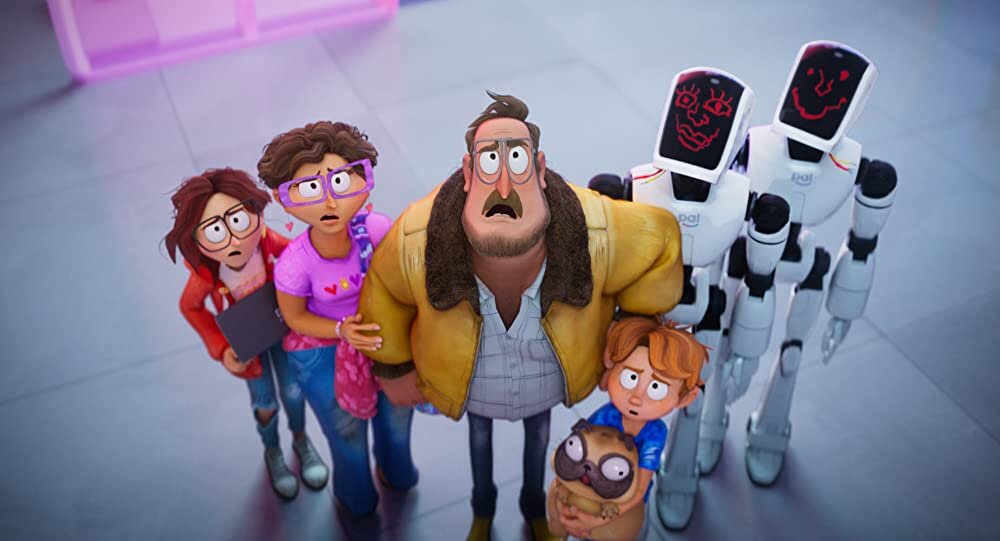THE MITCHELLS VS THE MACHINES
Directing: B
Acting: B
Writing: B+
Cinematography: B
Editing: C+
Animation: B+
There’s a lot I very much enjoyed about The Mitchells vs the Machines, and there’s a lot about it I found dumb or annoying. In the latter case, I have this sneaking fear that it’s just because I’ve gotten old and out of touch.
I mean, what’s the target demographic of this movie, anyway? The main protagonist being a young woman about to go to college—in the end casually revealed to be queer, no less—notwithstanding, it is clearly young children. I am 45 years old. Some disconnect here is inevitable.
This film is made by Sony Pictures Animation, which has made a few great animated features (especially Spider-Man: Into the Spider-verse), but also a lot of pretty forgettable stuff. You could argue back and forth about this: such an assessment is merely a matter of opinion. But, history still doesn’t like: unlike, say, Pixar Animation Studios, Sony hasn’t made much in the way of animated feature film classics. On the other hand, maybe the more pertinent question these days is: does that matter? I can’t really deny that The Mitchells vs the Machines will be wildly entertaining for plenty of viewers. This movie has been available to stream on Netflix for a week and it’s still #2 on their Top Ten list.
So, what difference does it make what I have to say about it? Do you want to know about how meta my thoughts about it got while I was watching it? Like, this movie regularly pokes fun at our tech-obsessed society, and yet it could never exist without the very technology it criticizes. Or maybe, is there some underlying layer where it’s making fun of our fear of A.I. rising up against us? There is literally a line where, right after a knowing throwaway line about giving tech companies far too much power, a character declares “it’s not all bad.”
Honestly, my biggest issue with this movie is the editing. Way too much going on at any given time, almost from beginning to end, in a movie that goes on for 113 minutes and would have worked better at 90. Relentlessly rapid-fire editing is just pandering to short attention spans. But is there a moral value to that, really? Perhaps not. Still, I find myself far more impressed with pacing that can keep us in rapt attention while still allowing the story to breathe. It is possible.
I cannot deny the clever wit in the writing, though. Even while I was finding myself overwhelmed with this movie’s aesthetic of sensory overload, it regularly cracked me up. Just the sequence where the robots turning off the world’s wifi causes the collapse of society—I don’t want to spoil it, but suffice it to say, I found it very funny. There were several moments when I really laughed pretty hard.
The Mitchells vs the Machines also has a massive lineup of famous talent among its voice actors: Danny McBride and Maya Rudolph as Rick and Linda Mitchell; John Legend and Chrissy Teigen as their social media-perfect neighbors John and Hailey Posey; Eric André as Zuckerberg-esque tech mogul Mark Bowman; Fred Armisen and Conan O’Brien as different robot voices. They are all fine; truth be told, they could have cast complete unknowns in these roles and it would have made no difference. The one possible exception is the inspired casting of Oliva Colman as the villain, the “personal assistant” program who refuses to accept becoming obsolete and takes over all the world’s computers. She never changes from being a simple face on a smart phone screen, which allows for a lot of great sight gags.
I wonder what kind of licensing deals they got for product placement in this film? There’s an entire sequence in which the Mitchell family battles an army of Furbys. Did Hasbro get money for that? Does the fact that the product’s inclusion trades on nostalgia more than anything else make any difference? I did enjoy the sequence, in any case. In the same sequence, the Mitchells are met with another army of kitchen appliances that all have “PAL” microchips in them.
It really should be noted that, my many criticisms aside, The Mitchells vs the Machines succeeds at a kind of casual inclusiveness rarely seen in any movie, but especially in an animated feature. Katie Mitchell (voiced by Abbi Jacobson), the aforementioned queer protagonist, looks white on first glance but is still clearly a multi-racial character: all characters are rendered as the race of their voice actors, so her mother (Maya Rudolph) is a person of color. Their neighbors, the Poseys, as a Black family. There are even subtle hints to Katie’s queerness throughout the movie; I kept wondering about the rainbows in the quasi-fantasy sequences about her (which are references to her interest in digital art) and whether or not they signified anything. A single line near the end of the film pulls it all together, the kind of line that in any other movie would have felt shoehorned in, but here was what tied together a bunch of details already seen.
In short, the writing in this movie is unusually skilled and nuanced, not to mention frequently hilarious. I just felt the movie got bogged down a bit by throwing way too much onscreen at once too much of the time, but maybe that’s just me.
Spoiler alert! The Mitchells adopt a couple of robots.
Overall: B

